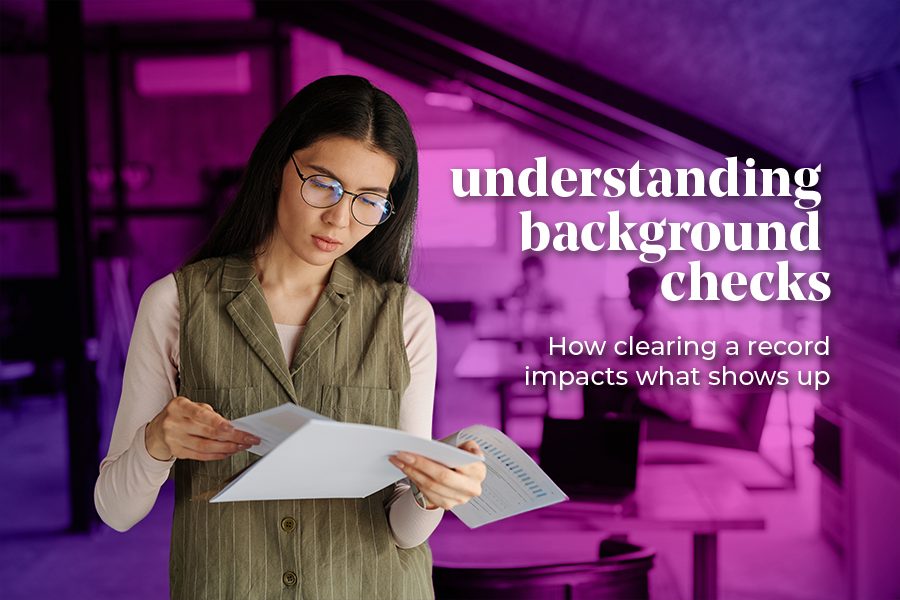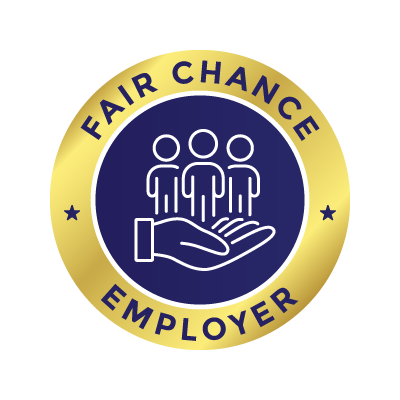If you’re applying for a job, renting an apartment, or even volunteering, you may need a background check. But what is a background check, and how does it work, especially if you have a record that’s been sealed or expunged? Let’s break it down.
What is a Background Check?
A background check is when someone, like an employer or landlord, looks up your past information. These checks are done by private, third-party companies that collect publicly available information. There are different types of background checks that look for different things. They might check things like:
- Criminal records: to see if you’ve been in trouble with the law.
- Employment history: to confirm where you’ve worked before.
- Housing History: to see if you’ve ever been evicted.
- Education records: to check if you graduated or earned certain degrees.
How Criminal Background Checks Work
When someone runs a background check, the third-party company uses their public information databases to put together a report on you. They might search federal, state, and local court databases and public safety registries to pull up any records tied to your name, such as arrests, convictions, or dismissals.
How far into the past a background check goes may depend on what is allowed under state law, as well as a company’s background check policy. Many companies and states only look at the last 7 years, but some are broader and look at everything. Similarly, some companies look at both dismissed and conviction records, and some only care to see convictions. Because policies and laws differ around the country, the safest thing to do is seal or expunge a record, regardless of how old it is.
Sealed or Expunged Records: What’s the Difference?
Depending on what state a record is in, there can be different options for record clearance. The two major remedies to clear records are expungement and sealing. These remedies are similar, and both give you the legal right to check “no” when asked if you have a criminal record, but they are slightly different from one another:
- Expunged records are removed from public view, meaning they will not show up at all in the public court record, on a person’s criminal history, or on an FBI report. Expungement is available for both misdemeanor and felony-level offenses in Utah and is available in Arizona only for marijuana-related offenses.
- Sealed records are hidden from the public, but they still exist. If a person’s name is searched, it may indicate that there is a record found, but it has been sealed. It won’t show whether it is a misdemeanor or felony, dismissal or conviction, or the nature of the charge. Generally, a record must be unsealed by a court to be viewed. Sometimes law enforcement authorities like the police or courts can access these records.
What Happens to Sealed or Expunged Records During a Background Check?
Under the Fair Credit Reporting Act, third party background check companies have an obligation to “ensure maximum possible accuracy” in their reports, which has generally been interpreted to mean they can’t disclose records that have been sealed or expunged.
Why Clearing Your Record Helps with Background Checks
Having your record sealed or expunged can open up many opportunities. Here’s how:
- More Job Opportunities: 9 out of 10 employers use background checks as part of hiring. With a clear record, you won’t have to worry about past mistakes affecting your chances.
- Improved Housing Options: 9 out of 10 landlords conduct background checks. Expungement or sealing can help you secure stable housing without the worry of a past record.
- Better Peace of Mind: Knowing that a background check won’t reveal past issues allows you to focus on building a bright future with the confidence that you will be judged fairly for what you can contribute, rather than the mistakes of your past.
Thinking About Clearing Your Record?
Clearing your record can be a great step forward. Rasa is here to make it easier and more affordable than ever to check your eligibility and start the process. If you think this might be right for you, reach out to us today!





Gusto Coupon says:
Spot on as usual. I shared this on my Facebook and my audience liked it!
Keep up the good work. 🙂
Ryan Johnson says:
Great breakdown of how record sealing or expungement impacts background checks.